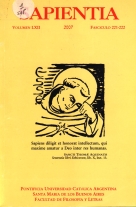Por favor, use este identificador para citar o enlazar este ítem:
https://repositorio.uca.edu.ar/handle/123456789/4487| Título: | El optimismo metafísico en la escatología de San Ireneo | Autor: | Alby, Juan Carlos | Palabras clave: | ESCATOLOGIA; METAFISICA; TEOLOGIA; Ireneo, Santo, ob. de Lyon, Siglo II | Fecha de publicación: | 2007 | Editorial: | Pontificia Universidad Católica Argentina. Facultad de Filosofía y Letras | Cita: | Alby, J. C. El optimismo metafísico en la escatología de San Ireneo [en línea]. Sapientia. 2007, 62 (221-222). Disponible en: https://repositorio.uca.edu.ar/handle/123456789/4487 | Resumen: | Resumen: Mucho antes de que San Agustín y Santo Tomás afirmaran que las cosas son buenas por el mero hecho de ser, ya en el siglo II de nuestra era Ireneo expresaba su confianza en la bondad fundamental de la materia. En los últimos seis capítulos del Adversus haereses (V, 31-36), el Obispo de Lyon plantea una verdadera teología de la historia que tiene como centro al hombre plasmado por Dios y llamado a su plenificación definitiva en la temporalidad y en el mismo mundo que lo vio caer. Al describir este tramo final y decisivo de la experiencia humana en la historia, nuestro autor nos revela su peculiar concepción del tiempo a la par que despliega un realismo escatológico totalmente opuesto al gnosticismo espiritualista de la época, que consideraba todo lo material como proveniente del error y la defección. A su vez, esta concepción de Ireneo supera tanto a los milenarismos ingenuos de su tiempo como a las utopías posteriores, en que el realismo escatológico es trocado en escatologismo radical. Se trata, en definitiva, de un optimismo metafísico propio de la visión cristiana que resultó novedoso para el ambiente espiritual de la época en que se gestó y que alienta a una prometedora relación del hombre con la naturaleza, ya sea desde la perspectiva del trabajo humano como fuerza transformadora de la misma, o desde un enfoque ecológico sin compromiso con posturas extremas, tales como el panteísmo o la explotación y sojuzgamiento brutal de los recursos naturales. Abstract: Long before which St. Augustine and St. Thomas asserted that the things are good by the mere fact of being, at the second century of our Age it was Irenaeus expressed his trust about the fundamental goodness of the matter. In the last six chapters of the Adversus haereses (V, 31-36), the Bishop of Lyon raises a theology of the History centered on the man shaped by God and callled to the definitive fullness at temporality and on the world that saw it fall. When describing this final and decisive segment of the human experience in History, our writer shows its peculiar conception about time that unfolds a totally opposite escathological realism against the spiritualist Gnosticism of these period, that considered all the material as arising from the error and the defection. This conception surpasses so much the ingenuous milenarisms of its times and the later utopias in which the escathological realism is transformed in a radical escathologism. The Metaphysical optimism of the Christian vision was so original for the spiritual atmosphere of the age at which it was developed and encourages to a positive relation between the man and the nature, either from the perspective of the human work like transforming force of the sameone, or from an ecological approach without commitment with extreme positions, such as the pantheism or the operation and brutal subjection of the natural resources. |
URI: | https://repositorio.uca.edu.ar/handle/123456789/4487 | ISSN: | 0036-4703 | Disciplina: | FILOSOFIA | Derechos: | Acceso Abierto | Fuente: | Versión original impresa en Sistema de Bibliotecas UCA: Sapientia Vol. LXII, Nº 221-222, 2007. |
| Aparece en las colecciones: | SAP - 2007 Vol LXII nro. 221-222 |
Ficheros en este ítem:
| Fichero | Descripción | Tamaño | Formato | |
|---|---|---|---|---|
| optimismo-metafisico-escatologia-san-ireneo.pdf | 231,9 kB | Adobe PDF |  Visualizar/Abrir |
Visualizaciones de página(s)
583
comprobado en 30-abr-2024
Descarga(s)
953
comprobado en 30-abr-2024
Google ScholarTM
Ver en Google Scholar
Este ítem está sujeto a una Licencia Creative Commons

